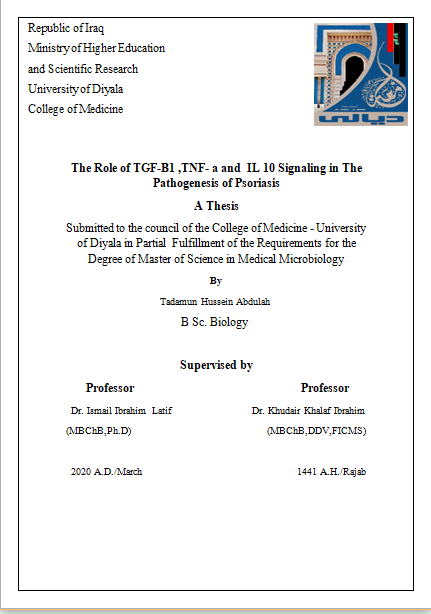Summary
Psoriasis is a multifactorial and inflammatory skin disease; the etiology is unknown. The clinical features are red, dry, itching and scaly skin. Lesions results from the hyper proliferation of skin keratinocyte cells. The hyper proliferation is caused by cytokines secreted by activation of the cells of immune system, an infiltrate of dendritic cells, T lymphocytes and innate immunity cells as well as the keratinocytes. A large number of cytokines have been shown to be raised in psoriatic lesion and serum concentrations, also associated with severity of psoriasis.
The aim of this study was to evaluate the role of TGF-B1, TNF-a and interleukin 10 in psoriasis which could help as predictive marker for severity of psoriasis in Baquba Teaching Hospital. This study included forty nine patients with psoriasis (27 males and 22 females) and thirty three healthy individuals (18males and 15 females). The ages of patients range between (7-70) years and healthy group(10-68) years. The study was performed in Baquba Teaching Hospital during the period from December 2018 till June 2019. Each case was diagnosed by dermatologist. Five milliliter of venous blood sample were obtained from each patient and placed in gel tube to separate the serum and stored at -80ºC.
The results of the study showed that the prevalence of psoriasis vulgaris in the patients were (89.8%) of cases. Guttat psoriasis were (4.1%), Erythrodermic (4.1%) and Nail psoriasis(2%). The result of TGF-B1 level showed highly significant differences in psoriatic patients than healthy individuals Mean±SD (8.25± 3.66) (P=0.005). Also the level of TNF-a showed very high significant difference in psoriasis patients than controls Mean±SD (52.63± 15.53) (P=0.001).
While IL-10 level were elevated among patients with psoriasis but insignificant difference between patients and controls Mean±SD (244.46±67.23) (P=0.9) by using Enzyme Linked Immunosorbent Assay (ELISA) technique.




